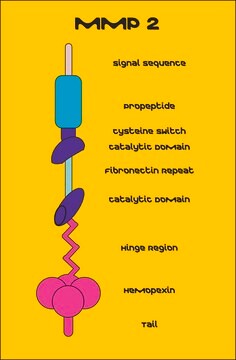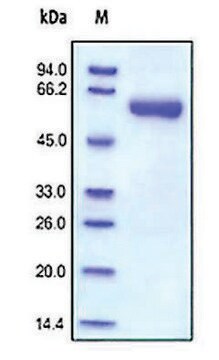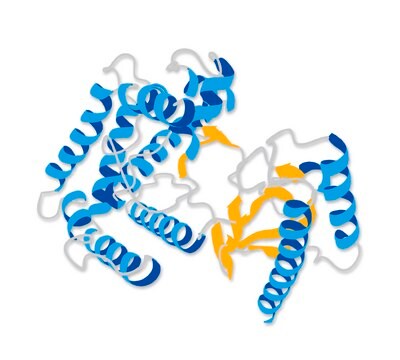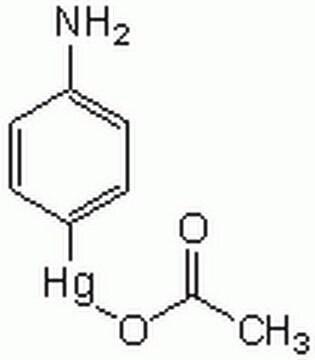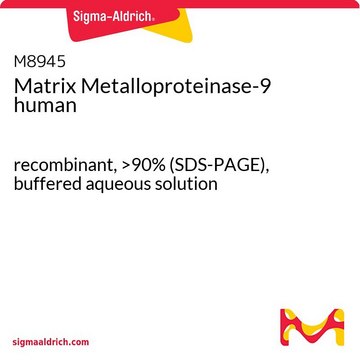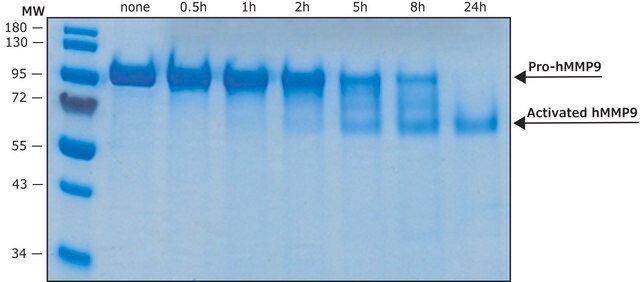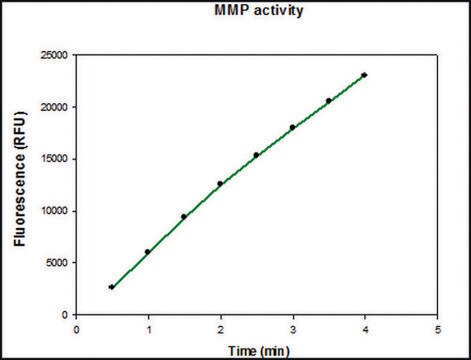SAE0174
MMP-2 human
recombinant, ≥1,000 pmol/min/μg, expressed in HEK 293 cells
Sinonimo/i:
72 kDa gelatinase, Gelatinase A, MMP-2, Matrix metalloproteinase-2, TBE-1
Autenticatiper visualizzare i prezzi riservati alla tua organizzazione & contrattuali
About This Item
Codice UNSPSC:
12352202
NACRES:
NA.32
Prodotti consigliati
Ricombinante
expressed in HEK 293 cells
Livello qualitativo
Attività specifica
≥1000 pmol/min-μg
Condizioni di spedizione
dry ice
Temperatura di conservazione
−70°C
Descrizione generale
Matrix Metalloproteinase-2 (MMP-2) is a member of the matrix metalloproteinase (MMP) family of proteins. MMPs participate in the breakdown of extracellular matrix in normal physiological processes like embryonic development, reproduction, and tissue remodeling, as well as in disease processes such as arthritis and metastasis. MMP-2 cleaves many substrates, including extracellular matrix components (collagens, fibronectin, and elastin), soluble metabolic mediators (e.g., apolipoproteins), secreted and extracellular matrix-anchored growth factors, and cytokines.
Along with MMP-9, MMP-2 is involved many pathophysiological processes, including leukocyte migration from the circulation into the tissue during inflammation, Chagas′ Cardiomyopathy, heart failure and chronic kidney disease. MMP-2 thus may be regarded as a potential therapeutic target.
As with most MMPs, MMP-2 is secreted as an inactive pro-protein, which becomes activated when cleaved by extracellular proteinases. This product is not pre-activated, and may be activated by APMA or otherwise
This product is expressed in human HEK 293 cells as a glycoprotein with a calculated molecular mass of 72 kDa (amino acids 110-660). The DTT-reduced protein migrates as a 75-80 kDa polypeptide on SDS-PAGE because of glycosylation. This protein is produced in human cells, without the use of serum. The human cells expression system allows human like glycosylation and folding, and often supports higher specific activity of the protein. This recombinant protein is expressed without artificial tags.
Along with MMP-9, MMP-2 is involved many pathophysiological processes, including leukocyte migration from the circulation into the tissue during inflammation, Chagas′ Cardiomyopathy, heart failure and chronic kidney disease. MMP-2 thus may be regarded as a potential therapeutic target.
As with most MMPs, MMP-2 is secreted as an inactive pro-protein, which becomes activated when cleaved by extracellular proteinases. This product is not pre-activated, and may be activated by APMA or otherwise
This product is expressed in human HEK 293 cells as a glycoprotein with a calculated molecular mass of 72 kDa (amino acids 110-660). The DTT-reduced protein migrates as a 75-80 kDa polypeptide on SDS-PAGE because of glycosylation. This protein is produced in human cells, without the use of serum. The human cells expression system allows human like glycosylation and folding, and often supports higher specific activity of the protein. This recombinant protein is expressed without artificial tags.
Caratteristiche e vantaggi
- Highly purified protein without artificial fusion tags
- Expressed in human cells (HEK 293) for proper glycosylation
- High substrate activity after activation with APMA or other methods
Stato fisico
This product is supplied as a 0.22 μm-filtered solution, containing 20 mM Trizma®, pH 7.5, containing 8 mM CaCl2, 119 mM NaCl, 20% Glycerol, and 0.05% Brij® 35.
Stoccaggio e stabilità
Store the product at –70 °C. The product retains its activity for at least 2 years as supplied. After initial thawing, it is recommended to store the protein in working aliquots at –70 °C.
Note legali
Brij is a registered trademark of Croda International PLC
Trizma is a registered trademark of Merck KGaA, Darmstadt, Germany
Esclusione di responsabilità
This product is for R&D use only. Not for drug, household, or other uses. Please consult the Safety Data Sheet for information regarding hazards and safe handling practices
Codice della classe di stoccaggio
12 - Non Combustible Liquids
Classe di pericolosità dell'acqua (WGK)
WGK 1
Punto d’infiammabilità (°F)
Not applicable
Punto d’infiammabilità (°C)
Not applicable
Scegli una delle versioni più recenti:
Certificati d'analisi (COA)
Lot/Batch Number
It looks like we've run into a problem, but you can still download Certificates of Analysis from our Documenti section.
Se ti serve aiuto, non esitare a contattarci Servizio Clienti
Possiedi già questo prodotto?
I documenti relativi ai prodotti acquistati recentemente sono disponibili nell’Archivio dei documenti.
M-J Hannocks et al.
Matrix biology : journal of the International Society for Matrix Biology, 75-76, 102-113 (2017-11-22)
This review focuses on the complementary roles of MMP-2 and MMP-9 in leukocyte migration into the brain in neuroinflammation, studied mainly in a murine model of experimental autoimmune encephalomyelitis (EAE) that has similarity to the human disease multiple sclerosis. We
Zhengyuan Cheng et al.
International journal of molecular sciences, 18(4) (2017-04-12)
Gelatinases are members of the matrix metalloproteinase (MMPs) family; they play an important role in the degradation of the extracellular matrix (ECM). This effect is also crucial in the development and progression of chronic kidney disease (CKD). Its expression, as
Il team dei nostri ricercatori vanta grande esperienza in tutte le aree della ricerca quali Life Science, scienza dei materiali, sintesi chimica, cromatografia, discipline analitiche, ecc..
Contatta l'Assistenza Tecnica.
